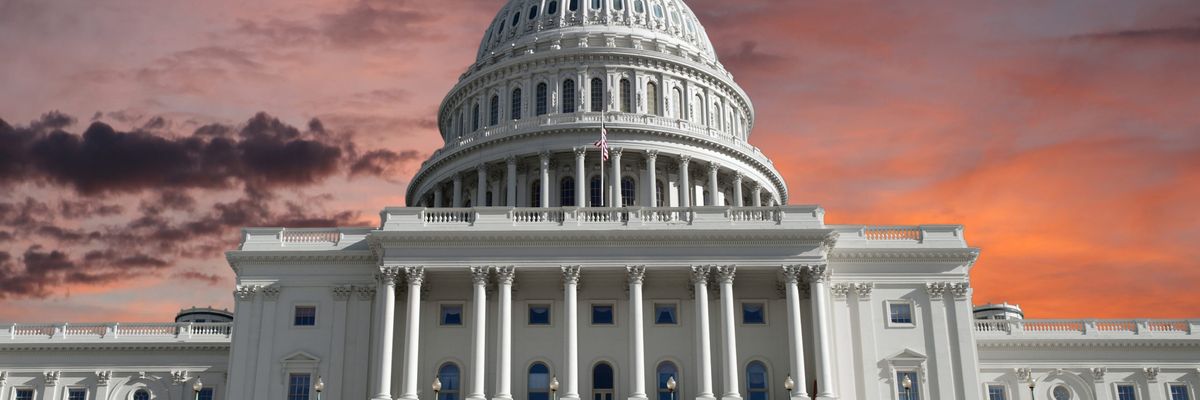Just four days after the resignation of Brookings president John Allen, following the disclosure of a federal investigation into whether he secretly lobbied for Qatar, new legislation has been introduced in the House of Representatives addressing the dangers of foreign influences seeking to corrupt U.S. elections, government officials, and think tanks.
The legislation, “Fighting Foreign Influence Act,” sponsored by Rep. Jared Golden (D-ME), would require tax exempt organizations, including think tanks, to disclose large contributions from foreign governments or foreign political parties, impose a lifetime ban on former U.S. military officers, presidents, vice presidents, senior executive branch officials, and members of Congress from lobbying for foreign principals, and require political campaigns to verify that online donations can be tied to a valid U.S. address.
“Non-profit organizations and partisan think tanks play an outsized role in shaping public opinion and influencing policy decisions in the United States,” said Rep. Lance Gooden (R-TX), in a press release. “We must understand where these groups get their funding, who influences their agenda, and if adversarial nations are using non-profit groups to undermine the United States. The Fighting Foreign Influence Act would ensure there is finally transparency and accountability in the non-profit sector.”
“Americans distrust government no matter which party is in power,” said Rep. Katie Porter (D-Calif.), who cosponsored the bill. “By cracking down on foreign gifts, donations, and lobbying, we can begin the hard work of earning back the people’s trust. I am proud to join Democrats and Republicans to help introduce the Fighting Foreign Influence Act.”
“Current disclosure requirements for online donations make it easy for bad actors to violate federal contribution limits, or worse, for foreign money to influence U.S. elections. As technology advances, we must continue to stay ahead of the curve in thwarting those who wish to inappropriately influence our political processes,” said Congressman Paul Gosar (R-Wyo.). “Full disclosure of online contributions will ensure that the American people know the sources of campaign money and will greatly assist with maintaining a system of free and fair elections.”
The bipartisan effort to push foreign influence and funding out of the U.S. political process occurs alongside a heightened Justice Department interest in enforcing the Foreign Agent Registration Act (FARA), a statute requiring agents of foreign principals to register with the Justice Department and regulate activities undertaken at the behest of their foreign clients.
Last week, a leaked search warrant revealed an FBI investigation into Brookings president John Allen, alleging he secretly lobbied for Qatar, a country which had also contributed over $30 million to Brookings over 14 years. Qatar was Brookings’ largest foreign government funder until the relationship ended last year. Allen denies the allegations and Brookings is not known to be under investigation.
And last month, the Justice Department sued billionaire real estate developer and Republican mega donor Steve Wynn to compel him to register as an agent of China under FARA. The government claims Wynn used his relationship with President Donald Trump to advance Chinese government interests. The Justice Department alleged that Wynn was operating casinos in the Chinese Special Administrative Region of Macau and sought to protect his business interests. Wynn has denied acting as an agent of the Chinese government.
The new bill’s sponsors cited a 2020 study by Ben Freeman, then-director of the Center for International Policy’s Foreign Influence Transparency Initiative, that revealed how at least $174 million flowed from foreign governments to U.S. think tanks between 2014 and 2018.
Freeman, who is now a research fellow at the Quincy Institute, and I authored a paper last year, “Restoring Trust in the Think Tank Sector,” laying out tangible steps that think tanks should adopt in order to earn back public trust. Steps included: disclosing sources of funding; complying with FARA, and proactively disclosing potential conflicts of interest between sources of funding and research products.
- States should let the feds handle foreign influence | Responsible Statecraft ›
- Sue Mi Terry: Sometimes you get whacked by the revolving door | Responsible Statecraft ›
- Some 80% of Hill 'experts' take $$ from arms makers, foreign interests | Responsible Statecraft ›
- The top five foreign influence fails of 2024 | Responsible Statecraft ›
- Welcome to 'The Lobby Horse' | Responsible Statecraft ›
- Trump lifts ban on US weapons companies bribing foreigners | Responsible Statecraft ›
- Foreign agent disclosures already down more than 30% | Responsible Statecraft ›















